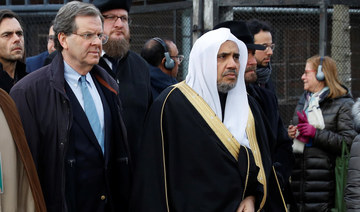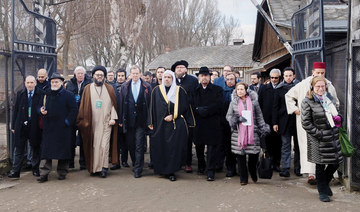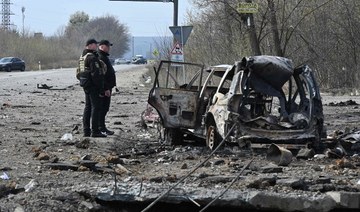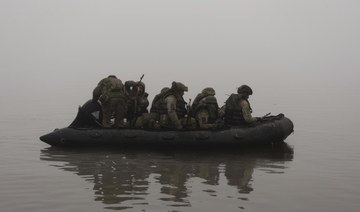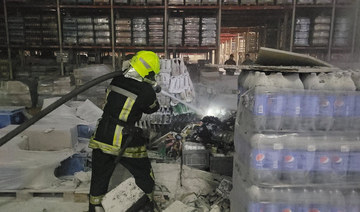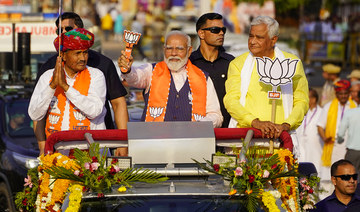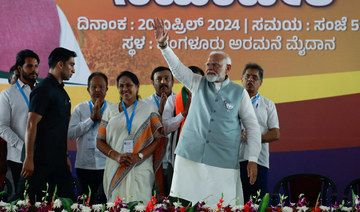OSWIECIM, POLAND: Survivors of the Auschwitz-Birkenau death camp gathered Monday for commemorations marking the 75th anniversary of its liberation, returning to the place where they lost entire families and warning about the ominous growth of anti-Semitism and hatred in the world.
In all, some 200 survivors of the camp were expected, many of them elderly Jews and non-Jews who have traveled from Israel, the United States, Australia, Peru, Russia, Slovenia and elsewhere. Many lost parents and grandparents in Auschwitz or other Nazi death camps, but were being joined by children, grandchildren and even great-grandchildren.
Some visited the site, now a memorial museum, on the eve of the anniversary. When asked by reporters for their reflections, they were eager to share their stories, hopeful that their message will spread.
“We would like that the next generation know what we went through, and it should never happen again,” said 91-year-old David Marks, his voice cracking. He lost 35 members of his immediate and extended family after they all arrived in Auschwitz from their village in Romania.
“A dictator doesn’t come up from one day to the other,” Marks said, saying it happens in “micro steps.”
“If we don’t watch it, one day you wake up and it’s too late,” he added.
Most of the 1.1 million people murdered by the Nazi German forces at the camp were Jewish, but other Poles, Russians and Roma, or Gypsies, were imprisoned there. Some of the Polish survivors walked with Polish President Andrzej Duda through the camp’s gate Monday wearing striped scarves that recalled the prison garb they wore more than 75 years ago.
Auschwitz was liberated by the Soviet army on Jan. 27, 1945.
World leaders gathered in Jerusalem last week to mark the anniversary in what many saw as a competing observance. Among them were Russian President Vladimir Putin, US Vice President Mike Pence, French President Emmanuel Macron and Britain’s Prince Charles.
Politics intruded on that event, with Duda boycotting it in protest after Putin claimed that Poland played a role in triggering World War II. Duda had wanted a chance to speak before or after Putin to defend his nation’s record in face of those false accusations, but he was not given a speaking slot in Jerusalem.
Duda said Monday that he felt that in Jerusalem, “Polish participation in the epic fight against the Nazis was ignored.”
“I want to stress that the Poles fought for the liberty of the entire world and many Polish citizens fell in the battle for liberty in the war against the Nazis,” Duda said. “Our fallen are etched in the annals of Polish history and we remember and honor them and expect others to do the same.”
Among those attending Monday’s observances at Auschwitz, which is located in southern Poland, a region under German occupation during the war, were German President Frank-Walter Steinmeier,Hungarian Prime Minister Viktor Orban, Ukraine’s President Volodymyr Zelenskiy and Israeli President Reuven Rivlin.
Rivlin recalled the strong connection that Israel shares with Poland, which welcomed Jews for centuries. It became home to Europe’s largest population of Jews — and later the center of Germany’s destruction of that community.
“The glorious history of the Jews in Poland, the prosperity of which the Jewish community has enjoyed throughout history, along with the difficult events that have taken place on this earth, connect the Jewish people and the State of Israel, inextricably, with Poland and the Polish people,” Rivlin said while standing alongside Duda.
London Mayor Sadiq Khan was guided through the camp by museum director Piotr Cywinski and viewed a plaque that includes the name of his city after it recently pledged a contribution of 300,000 pounds ($391,000) for the site’s preservation.
Organizers of the event in Poland, the Auschwitz-Birkenau state memorial museum and the World Jewish Congress, have sought to keep the spotlight on survivors.
“This is about survivors. It’s not about politics,” Lauder said Sunday as he went to the death camp with several of them.
Lauder warned that leaders must do more to fight anti-Semitism, including by passing new laws to fight it.
On the eve of the commemorations, survivors, many leaning on their children and grandchildren for support, walked through the place where they had been brought in on cattle cars and suffered hunger and illness and came close to death. They said they were there to remember, to share their histories with others, and to make a gesture of defiance toward those who had sought their destruction.
For some, it is also the burial ground for their parents and grandparents, and they will be saying kaddish, the Jewish prayer for the dead.
“I have no graves to go to and I know my parents were murdered here and burned. So this is how I pay homage to them,” said Yvonne Engelman, a 92-year-old Australian who was joined by three more generations now scattered around the globe.
She recalled being brought in from a ghetto in what was then Czechoslovakia by cattle car, being stripped of her clothes, shaved and put in a gas chamber. By some miracle, the gas chamber that day did not work, and she later survived slave labor and a death march.
A 96-year-old survivor, Jeanette Spiegel, was 20 when she was brought to Auschwitz, where she spent nine months. Today she lives in New York and is fearful of rising anti-Semitic violence in the United States.
“I think they pick on the Jews because we are such a small minority and it is easy to pick on us,” she said, fighting back tears. “Young people should understand that nothing is for sure, that some terrible things can happen and they have to be very careful. And that, God forbid, what happened to the Jewish people then should never be repeated.”
In Paris, French President Emmanuel Macron paid his respects at the city’s Shoah Memorial and warned about rising hate crimes in France, which increased 27 percent last year.
“That anti-Semitism is coming back is not the Jewish people’s problem: It’s all our problem — it’s the nation’s problem,” Macron said.
Auschwitz survivors warn of rising anti-Semitism 75 years on
Auschwitz survivors warn of rising anti-Semitism 75 years on

- Polish President walked through the camp’s gate Monday wearing striped scarves that recalled the prison garb they wore more than 75 years ago
- Some 200 survivors of the camp arrived from around the world for the memorial
Sweden to send NATO troops to Latvia next year: PM
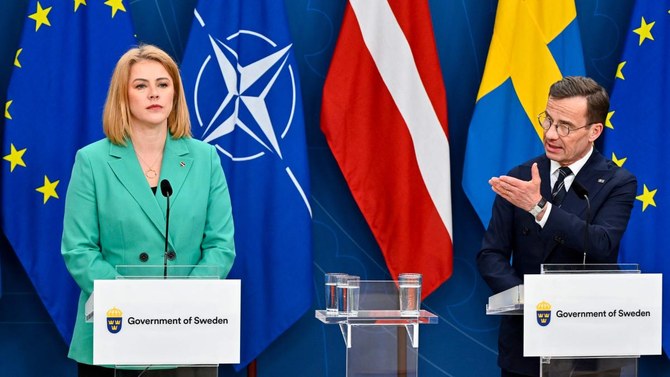
- The Swedish troop contribution was the first to be announced since the Scandinavian country joined NATO in March
- The battalion would be comprised of around 400 to 500 troops
STOCKHOLM: Sweden will next year contribute a reduced battalion to NATO forces in Latvia to help support the Baltic state following Russia’s invasion of Ukraine, Prime Minister Ulf Kristersson said Thursday.
The Swedish troop contribution was the first to be announced since the Scandinavian country joined NATO in March.
Kristersson had in January announced that Sweden would likely send a battalion to take part in NATO’s permanent multinational mission in Latvia, dubbed the Enhanced Forward Presence, aimed at boosting defense capacity in the region.
“The government this morning gave Sweden’s armed forces the formal task of planning and preparing for the Swedish contribution of a reduced mechanized battalion to NATO’s forward land forces in Latvia,” Kristersson told reporters during a press conference with his Latvian counterpart Evika Silina.
He said the battalion, which will be in Latvia for six months, would be comprised of around 400 to 500 troops.
“Our aim is a force contribution, including CV 90s armored vehicles and Leopard 2 main battle tanks.”
“We’re planning for the deployment early next year after a parliament decision,” he said.
UK police make fourth arrest after migrant deaths off France
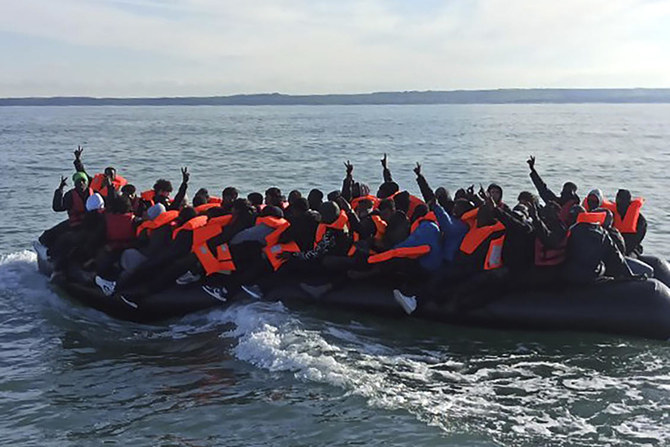
- NCA said it arrested an 18-year-old from Sudan late Wednesday on suspicion of facilitating illegal immigration and entering the UK illegally
- The latest arrest took place at Manston in Kent, southeast England, and the suspect was taken into custody for questioning
LONDON: UK police said Thursday that they had arrested another man after five migrants, including a child, died this week trying to cross the Channel from France.
The National Crime Agency (NCA) said it arrested an 18-year-old from Sudan late Wednesday on suspicion of facilitating illegal immigration and entering the UK illegally.
The arrest came as part of an investigation into the Channel small boat crossing which resulted in the deaths of five people on a French beach on Tuesday.
The NCA detained two Sudanese nationals aged 19 and 22, and a South Sudan national, also 22, on Tuesday and Wednesday, also on suspicion of facilitating illegal immigration and entering the UK illegally.
The 19-year-old has been released without charge, and is now being dealt with by immigration authorities, said the NCA.
The latest arrest took place at Manston in Kent, southeast England, and the suspect was taken into custody for questioning.
Three men, a woman and a seven-year-old girl lost their lives in the early hours of Tuesday in the sea near the northern French town of Wimereux.
They had been in a packed boat that set off before dawn but whose engine stopped a few hundred meters from the beach.
Several people then fell into the water. About 50 people were rescued and brought ashore but emergency services were unable to resuscitate the five.
Fifteen people have died this year trying to cross the busy shipping lane from northern France to southern England, according to an AFP tally.
That is already more than the 12 who died in the whole of last year.
Belgium summons Israeli ambassador over aid worker’s death
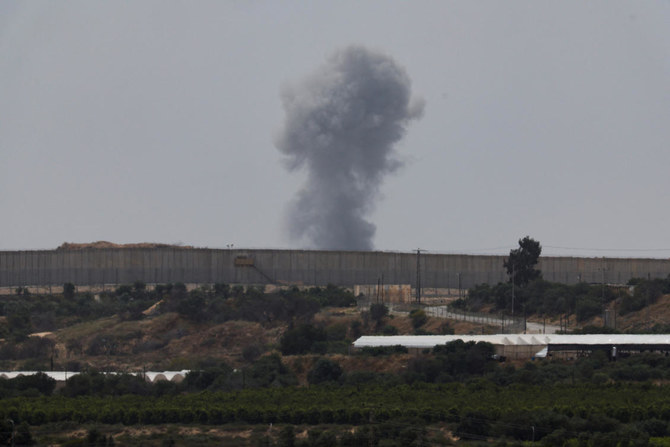
- Abdallah Nabhan, 33, along with his seven-year-old son, 65-year-old father, 35-year-old brother and six-year-old niece, were killed in Israel strike
- The airstrike hit the family home where 25 people were sheltering
BRUSSELS: Belgium said Thursday that it would summon Israel’s ambassador to explain the death in a Gaza airstrike of an aid worker with its Enabel development agency, as well as members of his family.
“Bombing civilian areas and populations is contrary to international law. I will summon the Israeli ambassador to condemn this unacceptable act and demand an explanation,” Foreign Minister Hadja Lahbib said on X.
Enabel said in a statement that Abdallah Nabhan, 33, along with his seven-year-old son, 65-year-old father, 35-year-old brother and six-year-old niece, were killed “after an Israeli airstrike in the eastern part of the city of Rafah.”
An Enabel employee & his family have been killed in Gaza. We express our solidarity with his family & colleagues.
— Hadja Lahbib (@hadjalahbib) April 25, 2024
Bombing civilian areas & populations is contrary to international law. I will summon the Israeli ambassador to condemn this unacceptable act & demand an explanation.
The airstrike hit the family home where 25 people were sheltering, including people displaced by the Israeli military operation in Gaza, Enabel said.
It said that Nabhan, who had worked on a Belgian development project helping young people find jobs, and his family were on a list Israel had of people eligible to exit Gaza, but that they were killed before being granted permission to leave.
Enabel’s chief, Jean Van Wetter, called their deaths “yet another flagrant violation by Israel of international humanitarian law.”
The health ministry in Gaza, run by the Hamas militant group, says more than 34,000 people have died in the war being waged in the Palestinian territory, most of them women and children.
Israel is conducting airstrikes and ground operations there in retaliation for a Hamas attack on October 7 that killed around 1,170 people in Israel, according to an AFP tally of Israeli figures.
Belgium, which currently holds the EU presidency, is among the European countries most vocal in condemning Israel’s operation as disproportionately deadly for Palestinian civilians.
Ukraine, Russia exchange fire, at least seven dead
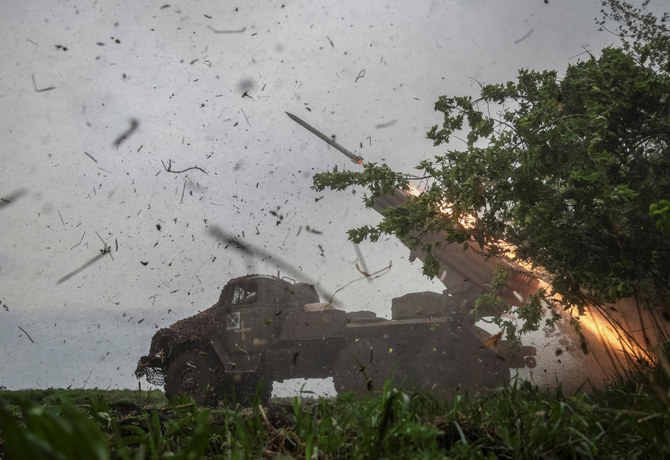
- The uptick in civilian deaths came as Russian forces are pressing in hard in the eastern Donetsk region of Ukraine
- A Ukrainian attack drone left two dead in Zaporizhzhia and two more were killed by Ukranian artillery fire in Kherson
MOSCOW: Ukrainian and Russian forces exchanged drone and artillery fire on Thursday, leaving at least seven dead, regional officials on both sides of the frontline announced.
The uptick in civilian deaths came as Russian forces are pressing in hard in the eastern Donetsk region of Ukraine, ahead of events in Moscow on May 9, hailing the Soviet Union's victory in World War II.
A Ukrainian attack drone left two dead in the southern region of Zaporizhzhia and two more were killed by Ukranian artillery fire in the southern Kherson region, officials said.
The Kremlin claimed to have annexed both regions in late 2022 even though Russian forces are still battling to gain full control over them.
"A man and a woman were killed as a result of a strike on a civilian car. Their four young children were orphaned," the Russian-installed head of Zaporizhzhia, Evgeny Balitsky, wrote on social media.
He said the children would be taken into care and provided with psychological assistance.
The Russian head of the Kherson region, Vladimir Saldo, said separately that two more people were killed by Ukrainian fire in the village of Dnipryany.
The two frontline regions saw intense bouts of fighting in 2022 and the summer of 2023, when Ukraine launched a counteroffensive that failed to meet expectations in Zaporizhzhia.
The brunt of the fighting has since moved to the eastern Donetsk region, which is also claimed by Moscow as Russian territory.
The Ukrainian head of the Donetsk region, Vadim Filashkin, said three people had been killed in separate bouts of shelling in the villages of Udachne, where two people were killed, and in Kurakhivka, where one person was killed.
"The final consequences of the shelling have yet to be determined," he said.
Keralites in Gulf take ‘vote flights’ to join India’s mammoth polls
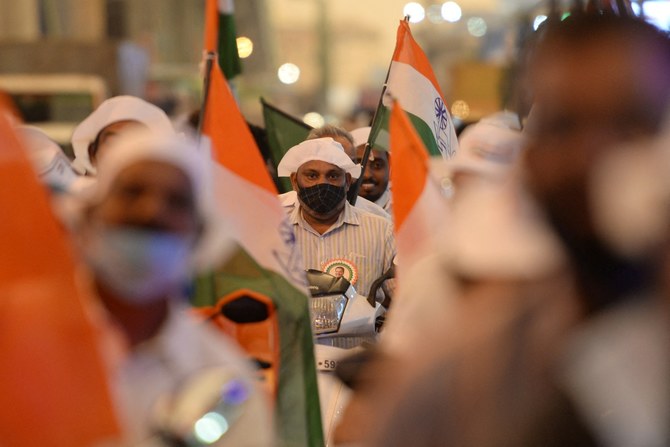
- ‘Vote flights’ are special chartered flights bringing Keralites home to cast ballots
- Kerala is the single main place of origin of Indian expats living in Gulf countries
NEW DELHI: Tens of thousands of Keralites working in Gulf countries are flying home to cast their ballots as the southern Indian state opens for voting on Friday in the world’s biggest general election.
India’s seven-phase polls started on April 19 and take place over the next six weeks, with more than 968 million people registered to vote.
Some states are completing the process in a day, and others have it spread out in several phases. Kerala is joining other 12 states, which according to the schedule go to the polls on April 26.
Indian nationals living overseas have been allowed to vote since 2011 and have to register with both the Election Commission of India and Indian embassies in their countries of residence. Their names will then appear on the voters’ list, but to cast their ballots, they still need to be physically present in their constituencies.
India has one of the world’s largest diasporas, especially in GCC countries, where at least 9 million Indian expats live and work. The southwestern coastal state of Kerala is the single main place of their origin. Some 3.5 million Keralites reside in Saudi Arabia, Oman, Kuwait, Qatar, Bahrain and the UAE.
“I think about 30,000 people have come from Saudi Arabia alone to vote. Not all of them have come on ‘vote viman’ (vote flights). Some have also come by regular flights,” said Iqbal Cheri, a marketing professional working in Dammam, who reached Kerala on Thursday.
Cheri referred to the flights that have been bringing citizens home to participate in Friday’s polls.
“They bring voters only and they are mostly chartered flights,” he said. “We have come here to vote and save our democracy and secularism. It’s an important election and we all need to vote to save the nation.”
His compatriot, Shareef Chola Paramdil, who works as a marketing head of a hospital in Dammam, said these election flights have been bringing Saudi Arabia-based Kerala voters home for the past few days.
“Last week, also three chartered flights came from Saudi Arabia,” he said.
“People who come on the chartered flights pay less compared to the regular flights, as group booking brings down the fare. Besides, these people don’t get more than a few days of leave. So, they come and cast their votes and leave the next day.”
There are 543 contested seats in the lower house of parliament. The party or coalition that wins at least 272 is going to form the government. The state of Kerala will contribute 20.
For Paramdil, the election is particularly important as a Muslim because incumbent Prime Minister Narendra Modi and his ruling Bharatiya Janata Party have been accused by the opposition and minority groups of marshaling majoritarian Hindu sentiment.
Critics say that India’s tradition of diversity and secularism has been under attack since Modi took power a decade ago and that his party has been fostering religious intolerance and discrimination.
“We want a government that does not discriminate in the name of religion, and we have been troubled by the politics of division that the government in Delhi has been practicing ever since it came to power in 2014,” Paramdil said.
Both Keralite Muslims and Hindus — like Gokul Padnabhan, a Kuwait-based professional in the oil and gas industry — see the election as an important exercise of their democratic rights.
“It’s very important to be here this time. That’s why I came for the vote,” Padnabhan said. “The vote will help us find the right person to rule us for the next five years.”
One of the organizations helping expat voters charter flights in Gulf countries is the Kerala Muslim Cultural Centre, an overseas wing of the Indian Union Muslim League.
“I feel around 100,000 people have come from the Gulf region to vote in this election,” said Ahamed Saju, head of the IUML’s student federation.
“Why they came is because this is a very crucial election this time ... Each and every vote is important. So, they thought that this time to protect our democracy, protect our constitution, protect our values and protect our secular credentials and the secular fabric of the country.”




